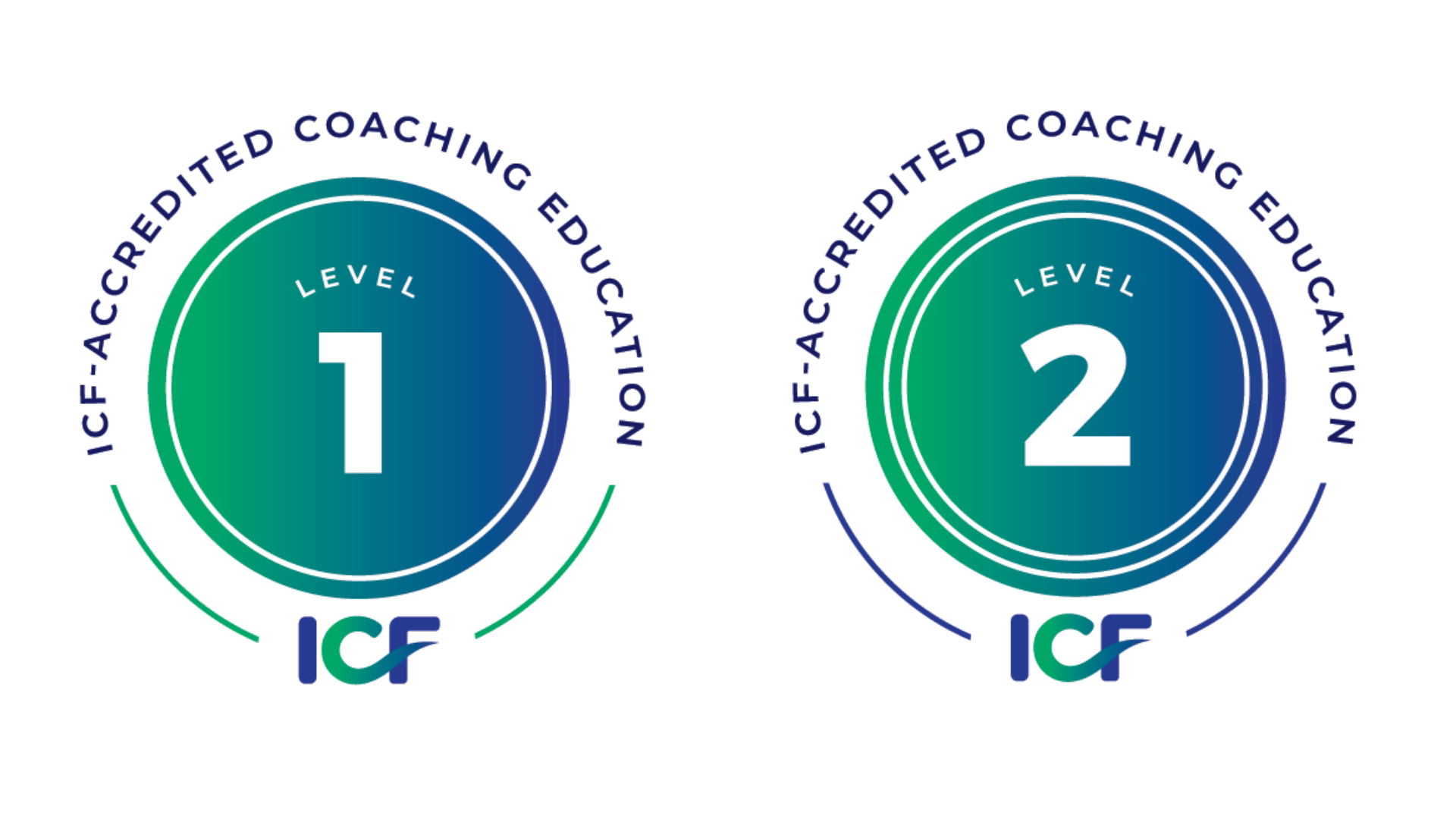
Ready to get started?
The next cohort begins in January 2025.

Accredited Coach Training Program
Higher Ed Coach Training is both a Level 1 and a Level 2 Accredited Coach Training Program with the International Coaching Federation.
Coaching 101 (22 synchronous core competency training hours)
Coaching 101 Training Description
Prerequisite: None
We begin our training with the logistical elements of coaching that will ensure that your coaching agreements and sessions run smoothly. Having a solid understanding of these logistics will not only make you a more effective coach, but will also help you create effective marketing materials about your services that will attract potential clients. Also, by getting some of these logistics settled and routinized, your attention can be devoted to the coaching of your clients.
There are several elements of the coaching session structure that will remain the same no matter what kinds of clients you are working with. In the latter half of this training, you will learn about these elements and the different session components that you will want to build into each meeting with your clients. Having structure for your coaching sessions will allow for the goals and objectives for each session to be clear to you and to your client. The course creation concept of backward design is used; concepts such as setting shared goals, defining measurable objectives, and creating accountability systems to check that goals are being met.
Coaching 101 Learning Objectives
Participants who complete this training successfully will be able to:
- describe the ethical standards that have been developed by the International Coach Federation
- explain the differences between coaching, therapy, mentoring, and consulting
- list the different elements of a coaching relationship that should be discussed before sessions begin, such as fees, scheduling, and the inclusion of others, if appropriate
- describe coaching methods to clients to ensure that you can meet their needs, and to ensure that they know your responsibilities as a coach and their responsibilities as a client
- demonstrate an appropriate coaching session structure in terms of events and timing
- create an overall coaching plan in collaboration with a client
- describe the four steps of co-creating an agenda with a client for a session
- design short, powerful questions that help a client get right to the heart of learning
- draft powerful questions using the learn/be/do framework
- demonstrate strategies for helping a client to create plans for accountability that best fit their needs, including using tools like reminders
Coaching Foundations & Championing the Client (26 synchronous core competency training hours)
Coaching Foundations Training Description
Prerequisite: Coaching 101
There are several foundational elements of the coaching relationship that serve to strengthen a coach’s ability to assist their clients in achieving their goals. In this training, we will start to explore specific tools and activities that help coaches to deepen their relationships with clients, ensure trust, and build confidence in a client’s ability to make choices and decisions that will move them in a positive direction.
In the second half of the training, we will explore different tools and activities to deepen the client experience even further. Each tool and activity is meant to help a coaching client feel seen and heard in the moment, so that they can focus on what they are learning about themselves and the actions they will need to take to achieve their goals.
Coaching Foundations Learning Objectives
Participants who complete this training successfully will be able to:
- respond to client needs in the moment
- develop strategies to promote greater understanding, awareness, and clarity in the moment
- help clients make discoveries that will inform actions they will take to achieve their goals
- increase self-knowledge that will inform the coach’s style and decisions
- utilize strategies that will help clients to increase their self-knowledge and awareness of the many contextual factors that can impact their movement forward
- identify a client’s needs in the moment as well as tools for holding space for a client to ensure that a session stays focused on a client’s goals and progress
- make space to share the coach’s own insights with a client in a session in ways that keep the client’s goals and needs centered
- utilize methods for brainstorming and experimentation that further a client’s actions to achieve their goals
- help clients name and explore concerns and fears that they have related to achieving their desired goals
- trust the energy of the moment in order to adjust coaching plans as a situation requires
- practice curiosity as a central and foundational component to all coaching relationships
- use a client’s language to bring clarity and new understanding to a client
- respectfully share perspectives that may be new to a client
- broaden a client’s perspective on issues where a client is uncertain or in areas that have been chosen as coaching priorities
- make connections between sessions, and between the larger picture of a client’s goals and an individual session agenda
Values-focused Coaching Tools & Confronting Obstacles (30 synchronous core competency training hours)
Values-focused Coaching Tools & Confronting Obstacles Training Description
Prerequisite: Coaching 101 & Coaching Foundations or ACC-level ICF certification
In this training, we will be exploring tools that help clients to think deeply about their priorities, values, and actions for moving forward toward their goals. Each tool will assist a client in aligning their daily actions with their larger life intentions. Some of these tools can be explored over several sessions, or offered as a “homework” option for clients to explore with self-study and then debrief with a coach in a future session.
After we have learned the tools to assist clients with deepening their understanding of their priorities and values, we will be focusing on tools that can help support clients when they are facing obstacles when trying to meet their goals. It is not always a clear pathway to achieving the goals we have in front of us, but the activities presented in this training will offer strategies for responding to a variety of different obstacles that clients might encounter.
Values-focused Coaching Tools & Confronting Obstacles Learning Objectives
Participants who complete this training successfully will be able to:
- brainstorm and create lists with clients who need of a lot of options to consider
- guide clients through what they have learned from past experiences to bring new understanding and clarity to their current situation
- help clients identify their superpowers so that they can build their confidence
- assist clients in staying accountable to their actions in their day-to-day lives
- respond appropriately when a client’s values or actions are in tension with each other or with their larger purpose
- assist a client with connecting to their deeper life’s purpose
- help a client develop a personalized mission statement that can guide future actions and assist with decision making
- playfully experiment with coaching and help clients do the same in their life and work
- infuse silliness and humor into coaching
- bring positivity to client’s patterns of negative self-talk
- help clients to identify the stories they are telling themselves about a particular scenario
- interrogate how client stories might include limiting assumptions
- utilize diverse accountability methods for client actions
- help clients explore how they can take away lessons from even the most difficult circumstances
- assist clients to reframe or learn from sitting in impatience or emotional discomfort
- celebrate small wins throughout a client’s coaching journey
- recognize a client’s incremental progress on larger goals
Habit Building, Creating Change & Group Coaching Fundamentals (30 synchronous core competency training hours)
Habit Building, Creating Change & Group Coaching Fundamentals Training Description
Prerequisite: Coaching 101 & Coaching Foundations or ACC-level ICF certification
Many clients come to coaching because they are looking to create change in their lives or work. In this training, we will explore different strategies that can help clients build new habits to create effective and lasting change. Each of the topics and tools will help you learn more about the components of habit creation and how these components can contribute to positive changes for clients.
In the second half of this training, we will explore different strategies for engaging with clients in group settings. When clients come together to be coached as a group, they are not just working with you, but also interacting with each other. Each topic and tool will help you to consider the different elements that contribute to an effective and impactful group coaching session.
Habit Building, Creating Change & Group Coaching Fundamentals Learning Objectives
Participants who complete this training successfully will be able to:
- describe theories of intrinsic and extrinsic motivation
- help a client better understand what prompts them to create and maintain habits and change
- list aspects of executive function
- assess a client’s strengths
- increase a client’s confidence through strategies that strengthen their self-determination
- assist a client in establishing a mindset for both creating and sustaining change
- help a client understand more about how they learn
- utilize strategies for time management
- help a client prioritize their tasks
- offer tools that assist a client with focusing on their values in daily work
- utilize the basic components of motivational interviewing
- bring clients together into a group coaching model
- set group coaching expectations
- design a group alliance
- practice strategies for helping a group to develop session outcomes that all individuals can benefit from
- coach one individual in front of a group for the benefit of the individual and the audience
- coach a group by involving all group members in the session
- create accountability structures that can be set up and shared within a group between coaching sessions
Client Confidence, Self-trust & Independence (26 synchronous core competency training hours)
Client Confidence, Self-trust & Independence Training Description
Prerequisite: Coaching 101 & Coaching Foundations or ACC-level ICF certification
In this training course, we will focus on methods to assist clients with building confidence in their decision making. Each strategy included in this course will help clients to become more independent in their choices, to learn to trust themselves more as a source of information, and to confidently leave the coaching relationship when they are ready to pursue their goals independently.
The second part of this training includes the discussion of a range of case studies focusing on clients in higher education settings. Each case study will help you to further explore different ICF Core Competencies and how you would proceed in the contexts presented.
Client Confidence, Self-trust & Independence Learning Objectives
Participants who complete this training successfully will be able to:
- identify 13 different decision-making strategies to use with clients in a range of situations
- facilitate a visioning exercise that can help clients to have more confidence in their own inner wisdom
- utilize tools to help clients practice empathy, especially when a client struggles with emotional intelligence
- utilize the concepts of growth and fixed mindsets within coaching relationships
- respectfully and gently strengthen a client’s resilience in challenging times and difficult situations
- help clients create systems that can help them to achieve their goals
- articulate different rationales for role playing with clients to help bring clarity to their interactions with other people
- recognize the importance of celebrating a client’s achievements through a range of possible strategies
- apply ICF Core Competencies when making decisions in higher education coaching environments
- use discernment to choose the best course of action in difficult situations based on knowledge of ICF Core Competencies
- practice answering questions related to scenarios similar to what will be presented on the ICF Coach Knowledge Assessment (CKA) exam
Coaching Neurodiverse Clients (30 synchronous core competency training hours)
Coaching Neurodiverse Clients Training Description
Prerequisite: Coaching 101 & Coaching Foundations or ACC-level ICF certification
This training focuses on empowering coaches to effectively support neurodiverse clients in achieving their goals. We will explore a range of tools specifically designed to help neurodiverse individuals identify their priorities, values, and actionable steps toward their aspirations. Each tool is crafted to align clients’ daily activities with their broader life intentions, facilitating a deeper understanding and commitment to their personal and professional growth, and fostering a sense of autonomy and self-efficacy.
In addition to foundational tools for clarifying priorities and values, the training will introduce strategies for navigating obstacles unique to neurodiverse individuals. Achieving goals is rarely straightforward, and neurodiverse clients may encounter distinct challenges. The activities and techniques presented will equip coaches with the skills to support clients in overcoming these hurdles, offering tailored solutions that respect and leverage their unique strengths. By the end of this training, coaches will be adept at creating a supportive and inclusive coaching environment, enabling neurodiverse clients to thrive and reach their full potential.
Coaching Neurodiverse Clients Learning Objectives
Participants who complete this training successfully will be able to:
- explain the concept of neurodiversity and identify various neurodiverse conditions, such as ADHD, autism, and dyslexia.
- recognize the unique strengths and challenges associated with different neurodiverse profiles.
- utilize specific tools to help neurodiverse clients articulate their priorities and values.
- facilitate sessions that align clients’ daily actions with their long-term goals and intentions.
- apply a range of coaching tools designed for neurodiverse clients to promote self-awareness and goal-setting.
- assign and debrief “homework” options that clients can explore independently.
- identify common obstacles neurodiverse clients may face when working towards their goals.
- employ strategies and techniques to help clients overcome these obstacles and maintain progress.
- develop a coaching approach that is inclusive, respectful, and empowering for neurodiverse clients.
- adapt communication styles and coaching methods to meet the individual needs of neurodiverse clients.
- encourage clients to take ownership of their growth and development.
- foster a sense of autonomy and self-efficacy in clients through tailored coaching practices.
- assess the effectiveness of different coaching tools and strategies with neurodiverse clients.
- make informed adjustments to coaching practices based on client feedback and outcomes.
- support clients in developing sustainable habits and routines that align with their goals.
- encourage clients’ ongoing reflection and adjustment to ensure long-term success.
Project Management by Design for Coaches (30 synchronous core competency training hours)
Project Management by Design for Coaches Training Description
Prerequisite: Coaching 101 & Coaching Foundations or ACC-level ICF certification
In this training, we explore the essential tools and methodologies that help clients in a range of higher education positions manage projects effectively, ensuring their efforts are aligned with their personal, professional, and/or institutional goals and values. As clients deepen their understanding of their project priorities and values, we will introduce tools to facilitate detailed planning, resource management, and timeline development.
Following this foundational work, we will focus on strategies to support clients in overcoming common project management obstacles. Achieving project goals can present various challenges, but the activities and techniques presented in this training will offer clients practical solutions for navigating setbacks, managing risks, and maintaining momentum. By the end of this training, coaches will be equipped with a comprehensive toolkit to guide clients through successful project management, fostering their ability to achieve project goals while aligning with their personal and professional values.
Project Management by Design for Coaches Learning Objectives
Participants who complete this training successfully will be able to:
- explain the key concepts and principles of effective project management.
- identify the stages of a project lifecycle, from initiation to closure.
- assist clients in defining clear, achievable project goals.
- help clients align their project goals with their broader personal and/or professional intentions and values.
- implement tools such as project timelines and work breakdown structures to facilitate detailed project planning.
- guide clients in creating comprehensive project plans that outline tasks, deadlines, and resource allocations.
- support clients in prioritizing tasks and managing their time efficiently.
- identify common obstacles in project management and develop strategies to address them.
- support clients in risk management, including identifying potential risks and creating mitigation plans.
- coach clients on effective communication techniques to ensure clear and consistent communication with stakeholders.
- facilitate collaboration tools and methods to enhance teamwork and project coordination.
- work with clients to monitor project progress regularly and make necessary adjustments to stay on track.
- leverage problem-solving tools to address issues that arise during a project lifecycle.
- foster a proactive mindset in clients to anticipate and resolve challenges efficiently.
- encourage clients to reflect on completed projects and identify lessons learned.
- guide clients in implementing continuous improvement practices to enhance future project performance.
- foster resilience and adaptability in clients to manage projects in dynamic environments.
Mentor Coaching (10 synchronous core competency training hours)
Mentor Coaching Training Description
Prerequisite: Coaching 101 & Coaching Foundations or ACC-level ICF certification
Mentor coaching is defined by the ICF as consisting of “coaching and feedback in a collaborative, appreciative and dialogued process based on an observed or recorded coaching session to increase the coach’s capability in coaching, in alignment with the ICF Core Competencies.”
Through Mentor Coaching, you will receive personalized feedback in achieving and demonstrating more advanced levels of coaching competency. Mentor Coaching takes place over three-months and includes a combination of group and individual meetings to review, assess, and reflect on coaching recordings.
Mentor Coaching Learning Objectives
Participants who complete mentor coaching successfully will be able to:
- self-assess their coaching skills based on ICF Core Competencies
- assess the coaching skills of others based on ICF Core Competencies
- utilize a range of coaching tools and activities to help clients meet their goals
- demonstrate PCC-level coaching skills
Want to see if this training is right for you?
Ask all your questions in a 30-minute Q&A session.
